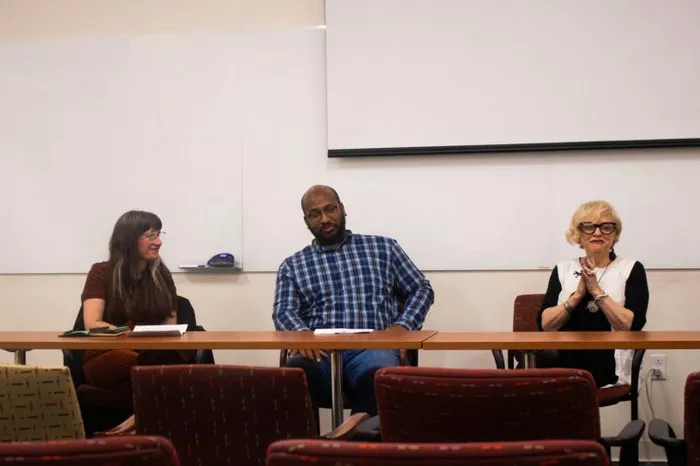During the first annual Sustainable Fashion Week, held at Washington University from March 28 to April 4, faculty members voiced strong concerns about the environmental and ethical costs of fast-fashion. Organized entirely by students, the week included events like a secondhand clothing bazaar, a repair fair, and a Project Runway-style fashion show. The capstone of the week was a panel featuring professors Mary Ruppert-Stroescu, Michelle DeLair, and Marcus Foston, who discussed the deeper implications of the fashion industry’s unsustainable practices.
Mary Ruppert-Stroescu, Associate Professor of Fashion Design at the Sam Fox School of Design & Visual Arts, questioned what happens after clothing is consumed, pointing to the enormous amounts of textile waste discarded each year. Echoing her concerns, fellow panelists emphasized the urgency of addressing the fast-fashion trend, where cheaply made clothing is produced and consumed at breakneck speed. They argued that while sustainable practices such as thrifting and do-it-yourself fashion are making a slow return, the influence of social media — filled with influencer hauls and unboxing videos — keeps consumer habits locked in unsustainable patterns.
Ruppert-Stroescu underscored that the fashion industry inherently drives change and desire. She explained that regardless of how long a garment takes to produce, the constant pursuit of novelty remains. She recalled her early career in Paris, where fast-fashion was already becoming common, with new designs going from prototype to store shelf in just a week. What has changed, she said, is not the concept but the massive scale on which it now operates.
Michelle DeLair, Director of Curricular Innovation and a professor of American Culture Studies, pointed out the complexity of addressing fast-fashion due to the opaque and global nature of its supply chains. Her students, when attempting to trace the journey of a product from creation to purchase, often discover how difficult it is to obtain accurate sourcing information. DeLair noted the paradox of low prices on platforms like Shein, where it becomes clear to students that such items cannot be produced and sold fairly under current systems.
Marcus Foston, associate professor at the McKelvey School of Engineering, emphasized the potential of technology to help reduce fashion’s environmental impact. His research into biologically derived materials offers alternatives to synthetic fabrics, but he cautioned that even with technological advances, affordability and consumer perception of value remain major challenges. He argued that making sustainable clothing truly accessible requires shifting both consumer expectations and the economic structures behind fashion production.
Ruppert-Stroescu acknowledged that even with growing awareness, most consumers still prioritize aesthetics over sustainability. She suggested that the message of environmental responsibility often takes a back seat to the visual appeal of a garment. This indicates a need for strategic marketing if more ethical fashion options are to gain wider acceptance.
The discussion also briefly touched on policy, noting that international supply chains and trade regulations complicate the fashion industry’s sustainability efforts. While tariffs and trade policies were not the main focus of the panel, the moderator mentioned potential impacts from impending U.S. government measures at the time. Ruppert-Stroescu highlighted that both consumer demand and government regulation are needed to drive meaningful change, as many industry leaders are hesitant to act without external pressure.
Despite these complex barriers, the panelists agreed that small, intentional choices by individuals can still matter. They advocated for buying secondhand, selecting high-quality items over fast, cheap fashion, and steering clear of polyester-based products to reduce waste. Ruppert-Stroescu expressed hope that education could help shift consumer behavior. She distinguished between “fashion,” which drives constant change, and “style,” which allows individuals to shape their own evolving aesthetic more sustainably.
Ultimately, Sustainable Fashion Week served as a call to reflect not just on what we wear, but on the broader systems that produce and dispose of clothing at a pace the planet can no longer afford.
Related Topics
- The Ringer Tee: A Classic Fashion Staple Makes a Stylish Comeback
- Miami Swim Week 2025: A Bold and Exciting Return to Miami Beach
- Chinese Designers Captivate Paris Fashion Week with Culture-Infused Couture

